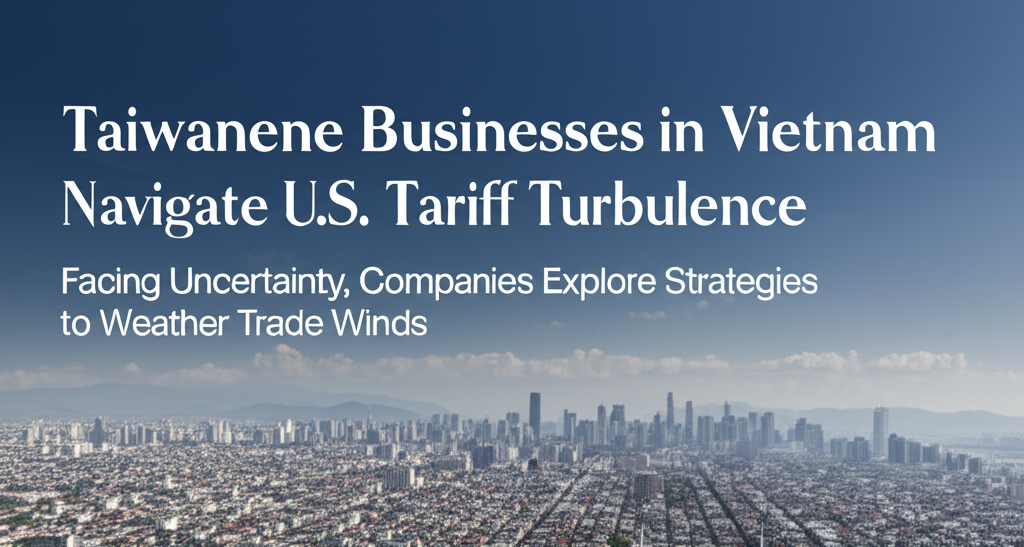Taiwanese Businesses in Vietnam Navigate U.S. Tariff Turbulence
Facing Uncertainty, Companies Explore Strategies to Weather Trade Winds

Hanoi, April 12 - Taiwanese businesses operating in Vietnam are actively seeking alternative strategies following the imposition of significant U.S. import duties on Vietnamese goods. This follows President Donald Trump's announcement of "reciprocal" tariffs impacting America's trading partners.
Lo Shih-liang (羅世良), chairman of Brico Industry Co., Ltd., a Taiwanese manufacturer of cast iron cookware and stove components in Vietnam, revealed that over 40% of his business is tied to the U.S. market. He characterized the fluctuating U.S. policy as an "emotional roller coaster ride" in a recent interview.
"I work during the day and stay up all night watching the news. I've been following U.S. news until 3 or 4 a.m.," said Lo, reflecting the anxieties surrounding these developments.
Initially, Lo was deeply concerned about the 46% tariff on Vietnamese goods announced on April 2, which was one of the highest rates imposed on the targeted countries.
However, Lo expressed some relief, though not complete ease, after the Trump administration announced a 90-day pause for almost all of the targeted countries, including Vietnam but excluding China, on Wednesday (Washington time).
Sun Chi-an (孫其安), the general manager of a factory in Vietnam's Bắc Ninh Province operated by Johnson Health Tech. Co., Ltd., a Taiwanese company that produces fitness equipment, shares these sentiments of emotional turmoil.
Sun admitted to having trouble sleeping and watching CNN nightly to monitor potential tariff changes.
The 46% tariff came as a surprise to Sun, especially considering the positive state of U.S.-Vietnam relations.
Faced with this uncertainty, the company hesitates to make major production changes that could impact quality, particularly given consistent customer demand.
Consequently, production and raw material preparation are proceeding as planned, with efforts focused on retaining factory staff, according to Sun.
Although upcoming negotiations between Hanoi and Washington might reduce tariffs, Sun believes a full removal of the "reciprocal" tariff is unlikely, which would increase the company's production costs.
His company plans to discuss cost-sharing with suppliers and analyze competitors' strategies. The latter aims to mitigate the tariff's impact by passing some costs on to consumers.
Sun sees an opportunity in these "reciprocal" tariffs, as many of Johnson's competitors depend heavily on supply chains in China. The tariff on Vietnam, although expected to remain high after negotiations, is likely to be lower than the rate imposed on China.
As of Saturday, the U.S. imposed a minimum tariff rate of 145% on all imports from China.
Meanwhile, Lo mentioned that Brico is using the 90-day window to advise clients to assess inventory, place orders early to ensure shipments arrive in the U.S. during the pause.
He added that transferring goods to the company's warehouses in Mexico could provide further flexibility.
Lo revealed that the company, traditionally focused on developed countries with high consumer spending, is adjusting its long-term market strategy.
Brico is now targeting mid-tier markets in regions like the Middle East and Europe, with the aim of lowering its reliance on the U.S. market from 45% to approximately 30%.
Other Versions
Error: All DeepL API keys exceeded 95% usage.
Error: All DeepL API keys exceeded 95% usage.
Error: All DeepL API keys exceeded 95% usage.
Error: All DeepL API keys exceeded 95% usage.
Error: All DeepL API keys exceeded 95% usage.
Error: All DeepL API keys exceeded 95% usage.
Mga Negosyo sa Taiwan sa Vietnam, Nilalabanan ang Kaguluhan ng Taripa ng U.S.
Error: All DeepL API keys exceeded 95% usage.
ธุรกิจไต้หวันในเวียดนามรับมือความปั่นป่วนจากภาษีสหรัฐฯ
Doanh nghiệp Đài Loan tại Việt Nam đối mặt với biến động thuế quan của Mỹ

